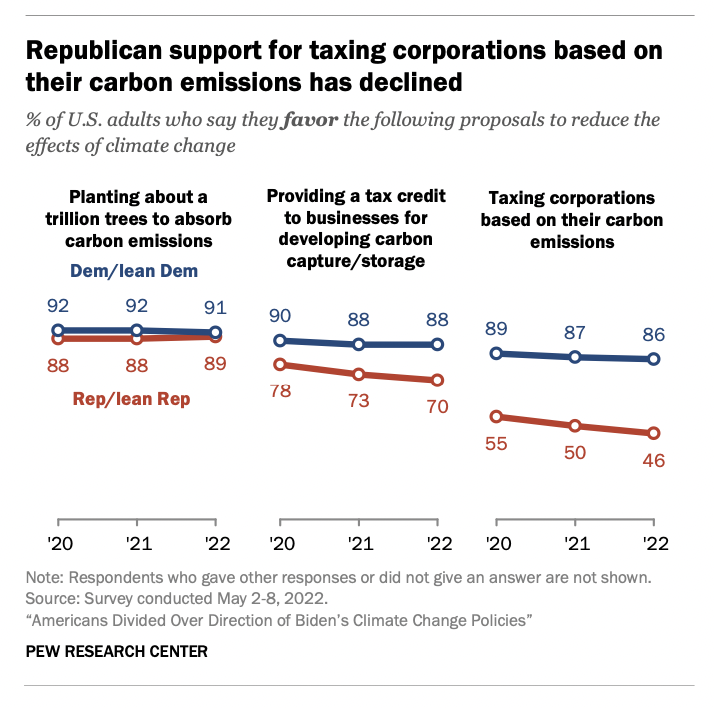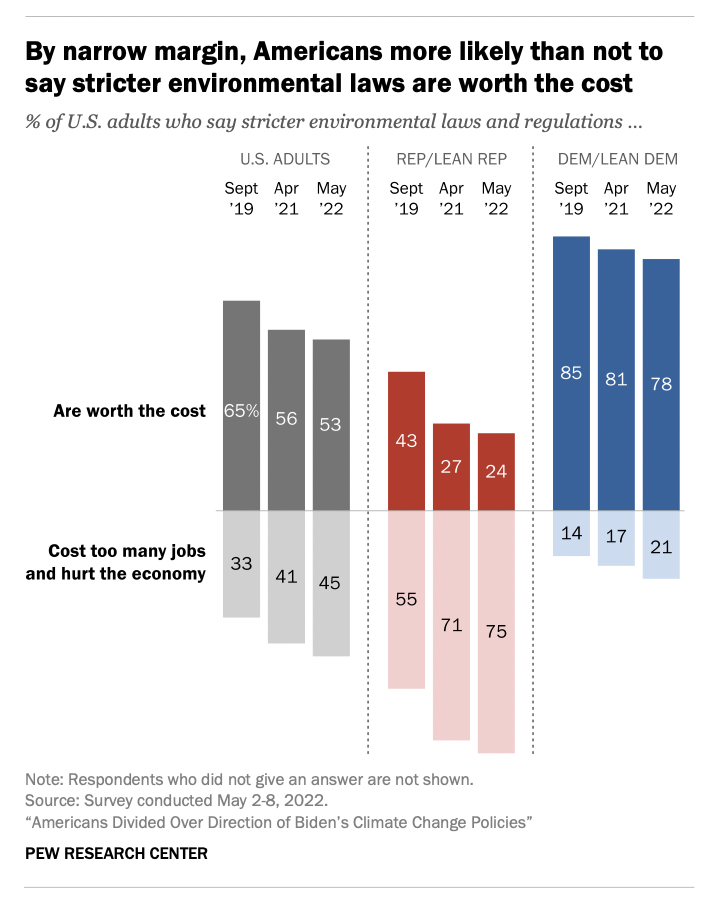On climate, Democrats and Republicans don’t inhabit the same reality

There are many dramatic contrasts between the Biden administration and its immediate predecessor, and climate policy is high on the list. After four years of promises to restore coal use and claims that windmills caused cancer, we have an administration that promises to cut emissions in half by the end of the decade.
What does the US public think of this change? The Pew Research Center has been tracking attitudes on climate issues for the past several years, and it has new polling data from early May. The polling shows a general weakening of support for climate policies, with most of the change coming from Republicans. But it also shows that the two parties may not even inhabit the same reality, as they largely disagree about whether the weather has changed.
Mind the gap
Pew’s data is based on a survey of over 10,000 US residents, and it was performed in early May (that’s before the most recent surge in gasoline prices, which may be relevant for some questions). In a number of cases, the same questions have been asked for several years running, so we have some data on how attitudes have changed over the transition from the Trump administration to the Biden administration.
Overall, a slim plurality (49 percent to 47 percent) of the country feels that Biden’s policies are taking the country in the right direction when it comes to climate. But the partisan split here is enormous, with 79 percent of Democrats agreeing and 82 percent of Republicans feeling the policies are taking the country in the wrong direction.
That said, there’s solid support for most of the actual policies: 90 percent support tree-planting efforts, 79 percent support tax credits for carbon capture, 72 percent want to see requirements for more renewable power, 68 percent support emissions-based taxes on companies, and 67 percent approve of incentives for hybrid and electric vehicles. Even among Republicans, support for all of these items is over 45 percent.
The one policy that had low support across the board was phasing out internal combustion vehicles. Only 43 percent of the public favored this course of action, with 55 percent opposed. Sixty-five percent of Democrats did support this measure, while 82 percent of Republicans opposed it.

The support for these policies has dropped slowly over the last few years, largely driven by falling support from Republicans. It’s possible that they were more accepting of government action when their party ran the government. A similar thing was apparent when Democrats were asked about whether the government was not doing enough about various environmental issues. Those numbers started to drop once Biden took office.
Different realities
A large number of people now think they’ve experienced the reality of climate change. Over 40 percent say they’ve experienced extreme weather and/or extended heat waves, while 30 percent say their region has gone through drought and another 20 percent cite major wildfires. In all these cases, 80 percent of those who said they had experienced these problems suspect that climate change has contributed to them (as, in many cases, it has).
As you’d expect, these results show regional differences, with people in the Western United States far more likely to note heat waves, droughts, and wildfires; other areas of the country more likely to note severe storms.
The disturbing thing here is that partisanship is clearly skewing basic perceptions of reality. With a single exception, Democrats were more likely to say they’ve experienced these phenomena than Republicans—the lone exception being drought in the West. The gaps in these perceptions could be enormous, such as a 24-point difference between the parties in the Northeast when noticing severe storms and heat waves. Most gaps were smaller, but their consistency across regions and weather phenomena was striking.

Given the severe cause of weather disasters, you might expect an increase in support for environmental measures. But the opposite appears to be true. The belief that environmental regulations provide benefits that outweigh their costs to the economy has dropped from 65 percent in 2019 to 53 percent today. Again, this is largely driven by a large decrease in Republican support after Trump left office—a drop that leaves 75 percent of Republicans saying environmental regulations are too expensive. But even among Democrats, support dropped from 85 percent to 78 percent over the same period.
Obviously, there were many other events that affected the public’s attitude over the course of the last few years, including a million people dying from the pandemic and the government measures that have been taken to try to reduce that figure. So we may have to wait until next year to get a stronger sense of whether this drop in support represents an ongoing trend.
https://arstechnica.com/?p=1867088